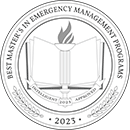
MPA – Emergency Management & Homeland Security
Safeguard Your Community
Is the safety and security of your community among your highest priorities? Our online and on-campus Master of Public Administration – Emergency Management & Homeland Security degree can equip you with emergency management skills to identify, assess and prepare for potential threats from domestic terrorism to natural disasters. You’ll delve into case studies, service-learning opportunities, and sophisticated analysis to advance your strategic planning and leadership skills.
Gain Strategic Insight
Explore trends in modern terrorism, counterterrorism tactics, and disaster response planning.
Access Faculty Experts
Be mentored by renowned scholars and skilled practitioners.
Become an Exceptional Leader
Regent University’s MPA program equips Christian servant leaders with exceptional character and competence to promote the public interest.
Earn Your MPA in Two, Three, or Four Years
Full Time: Four semesters (8 8-week sessions; approx. 9 credits per semester) Part-Time: Six to seven semesters part-time (12-14 8-week sessions; 2 courses per semester).
Presented from a Christian perspective, this degree is supported by our respected faculty in Virginia Beach. Regent has been ranked among the Top National Universities by the U.S. News & World Report (2024). We have also been recognized as a Military Friendly Top 5 School by Military Friendly®, 2024-25, and among the Top 10 Best for Vets Colleges: Online & Nontraditional by Military Times, 2020.
Please complete the Request Information form on this page to learn more about this program.
On completing the Master of Public Administration – Emergency Management & Homeland Security degree, you can:
- Conduct risk assessments and develop solutions to stop potential threats.
- Apply an ethical and compassionate mindset when formulating plans and policies.
- Forecast and diffuse potential threats by developing and implementing strategic action plans.
Career Opportunities
- Intelligence Analysis
- Emergency Management
- Information Security
- Law Enforcement & Public Safety
2024-25 Semester Check-In Deadlines
All students are expected to check-in for the semester two weeks before the session start date. Students should apply, be accepted, enroll in their first courses, and confirm a plan to pay for their courses prior to this date.
| Session | Semester Check-In | Session Start Date |
|---|---|---|
| Session A | Friday, August 9 | Monday, August 19 |
| Session B | Friday, October 11 | Monday, October 21 |
| Session C | Wednesday, January 8 | Monday, January 13 |
| Session D | Friday, March 7 | Monday, March 17 |
| Session E | Friday, May 2 | Monday, May 12 |
| Session F | Friday, June 13 | Monday, June 23 |
Admissions Requirements
Step 1: Apply to Regent University
Submit your application using the Regent University Online Application.
Note: If you are unable to complete our application due to a disability, please contact our Admissions Office at 757.352.4990 or admissions@regent.edu and an admissions representative will provide reasonable accommodations to assist you in completing the application.
Step 2: Submit Your Unofficial Transcripts
Submit your unofficial transcripts to regent.edu/items.
Upon submitting your application, you will receive an email requesting authorization for Regent University to obtain your official transcripts from your U.S. degree-granting institution. International transcripts must be evaluated by a NACES, AACRAO or NAFSA approved agency.
Step 3: Submit Your Government-Issued ID
To ensure academic integrity, Regent University requires a copy of a government-issued ID. Please submit a scanned copy or photograph of it to regent.edu/items.
Please feel free to contact the Office of Admissions at 757.352.4990 or admissions@regent.edu should you have any further questions about the application process.
Note: All items submitted as part of the application process become the property of Regent University and cannot be returned.
PART-TIME STUDENTS
| Degree | Tuition Cost Per Credit Hour | Average Credit Hours Per Semester | Average Tuition Per Semester |
|---|---|---|---|
| Master of Arts (MA) | $695 | 6 | $4,170 |
| Master of Arts in Public Administration (MPA) | $695 | 6 | $4,170 |
| Doctor of Philosophy (Ph.D.) | $900 | 6 | $5,400 |
Full-Time Students
| Degree | Tuition Cost Per Credit Hour | Average Credit Hours Per Semester | Average Tuition Per Semester |
|---|---|---|---|
| Master of Arts (MA) | $695 | 9 | $6,255 |
| Master of Arts in Public Administration (MPA) | $695 | 9 | $6,255 |
| Doctor of Philosophy (Ph.D.) | $900 | 9 | $8,100 |
Student Fees Per Semester
| University Services Fee (On-Campus Students) | $850 (Fall & Spring) $700 (Summer) |
| University Services Fee (Online Students) | $700 |
Part-Time Students
| Degree | Tuition Cost Per Credit Hour | Average Credit Hours Per Semester | Average Tuition Per Semester |
|---|---|---|---|
| Master of Arts (MA) | $695 | 6 | $4,170 |
| Master of Arts in Public Administration (MPA) | $695 | 6 | $4,170 |
| Doctor of Philosophy (Ph.D.) | $900 | 6 | $5,400 |
Full-Time Students
| Degree | Tuition Cost Per Credit Hour | Average Credit Hours Per Semester | Average Tuition Per Semester |
|---|---|---|---|
| Master of Arts (MA) | $695 | 9 | $6,255 |
| Master of Arts in Public Administration (MPA) | $695 | 9 | $6,255 |
| Doctor of Philosophy (Ph.D.) | $900 | 9 | $8,100 |
Student Fees Per Semester
| University Services Fee (On-Campus Students) | $850 (Fall & Spring) $700 (Summer) |
| University Services Fee (Online Students) | $700 |
*Rates are subject to change at any time.
Whether you are a prospective student or a current student, your questions matter. Please take a few moments to skim our Frequently Asked Questions. If you cannot find the answer to your question, please contact us.
Andrew Owen, MPA, Class of 2017





